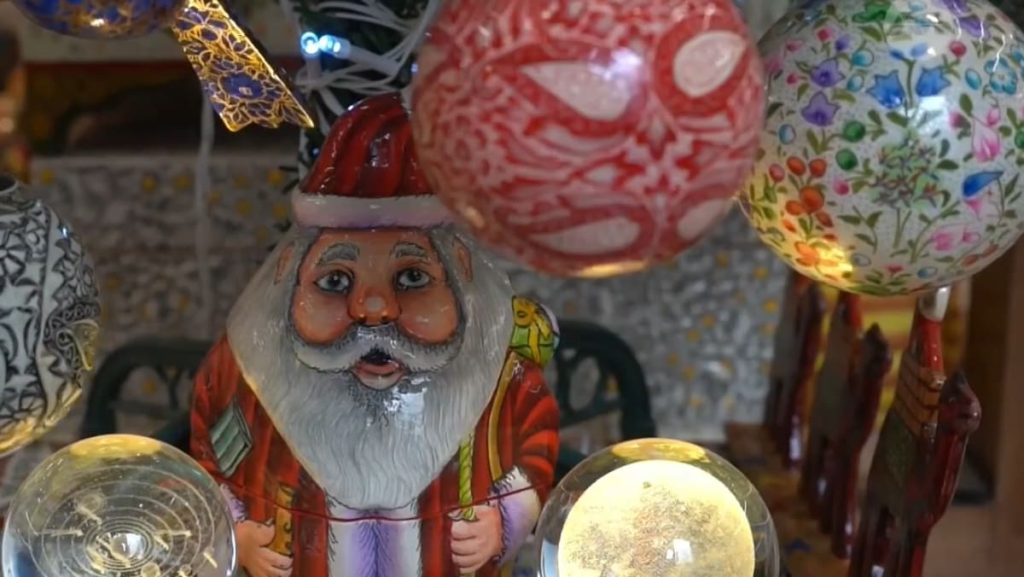The once-thriving papier-mâché industry in Srinagar, Kashmir, a region renowned for its intricate artistry, finds itself grappling with a severe downturn, a stark contrast to its formerly robust presence in the international market. Mohammad Mehdi, owner of Sunbeams, a local handicrafts store, reminisces about a time when millions of papier-mâché Christmas ornaments and Easter eggs were exported globally, a testament to the industry’s former glory. Now, however, the industry is facing a precipitous decline in demand, leaving artisans and exporters struggling to navigate an uncertain future. The impact of geopolitical conflicts and recent regional setbacks has cast a long shadow over the industry, threatening the livelihoods of countless individuals dependent on this traditional craft.
The primary culprit behind this declining demand is a combination of global uncertainties stemming from major geopolitical events. The ongoing Russia-Ukraine war, which has disrupted global trade and economic stability, has significantly impacted consumer confidence. Furthermore, the escalating conflict in the Middle East, triggered by the Israel-Hamas war, has further exacerbated the situation, creating a climate of apprehension among international buyers. These conflicts have led to a reluctance among clients to purchase papier-mâché products in bulk, as they are unsure about future demand and consumer spending habits. This hesitation reflects a global trend towards cautious spending in times of uncertainty, as consumers prioritize essential needs over discretionary purchases like decorative items.
Ubaid Ali, a manufacturer and exporter of papier-mâché products, echoes the concerns voiced by many in the industry. He highlights the growing apprehension among his clients in Europe, the Middle East, and America, who are increasingly hesitant to import goods due to the unpredictable global landscape. These clients express concerns about the future, indicating that consumers are prioritizing saving money over spending it on non-essential items. This shift in consumer behavior has directly impacted the demand for papier-mâché products, leaving artisans and exporters with mounting inventories and dwindling revenue streams. The ripple effect of these global events is being felt deeply within the Kashmiri artisan community, threatening an art form that has been passed down through generations.
Adding to the woes of the papier-mâché industry are a series of regional setbacks that have significantly impacted tourism, a vital source of revenue for local artisans. The devastating 2014 Kashmir floods, which caused widespread destruction and displacement, dealt a severe blow to the region’s economy and tourism sector. The 2019 decision by the Indian government to revoke the special status of Jammu and Kashmir further complicated matters, leading to political unrest and a decline in tourist arrivals. The subsequent global COVID-19 pandemic in 2020 delivered another devastating blow, effectively halting international travel and further crippling the local economy. These cumulative setbacks have created a perfect storm for the papier-mâché industry, compounding the challenges posed by global conflicts and shifting consumer behavior.
In an attempt to adapt to the changing market dynamics, manufacturers like Ubaid Ali have begun exploring new product lines, hoping to diversify their offerings and attract new clients. This diversification strategy involves experimenting with different designs, materials, and applications of papier-mâché, moving beyond the traditional focus on Christmas and Easter decorations. However, this transition is not without its challenges. Workers specializing in the production of seasonal items are finding it difficult to adapt their skills to the creation of new products, requiring significant retraining and investment. The industry is at a crossroads, needing to innovate while simultaneously preserving its traditional artistry.
Despite the bleak outlook, artisans like Ghulam Nabi Shah remain hopeful. They believe that a resolution to the ongoing conflicts will eventually restore stability and allow people to return to celebrating festivals and special occasions with renewed enthusiasm. This resurgence in celebratory traditions would, in turn, revive the demand for papier-mâché products, offering a glimmer of hope for the struggling artisans. The resilience and optimism of these artisans underscore the deep cultural significance of papier-mâché in Kashmir and their unwavering commitment to preserving this unique art form. Their hope rests on a return to peace and stability, allowing the vibrant colors and intricate designs of their creations to once again adorn homes and celebrations around the world. The future of this centuries-old craft hinges on the delicate balance between adapting to the changing global landscape and preserving the rich artistic heritage that defines the Kashmiri papier-mâché tradition.

